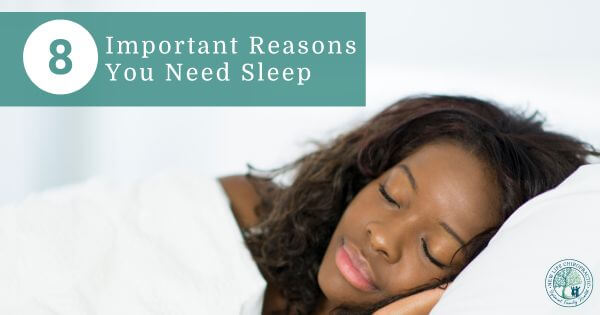
According to the CDC, lack of sleep is a public health epidemic, noting that insufficient sleep has been linked to a wide variety of health problems. After reviewing more than 300 studies to determine how many hours of sleep most people need to maintain their health, an expert panel concluded that, as a general rule, most adults need right around 8 hours per night. Unfortunately, an estimated 40 percent of Americans are sleep deprived. Many get less than 5 hours of sleep per night, which can have a wide range of health repercussions, from an increased risk of accidents, weight gain and chronic diseases, to reduced sex drive, and decreased sexual satisfaction.
The Reasons You Need Sleep to Stay Healthy
Weight Gain
On a more physical level, getting less than seven hours of sleep per night has been shown to raise your risk of weight gain, by increasing levels of appetite-inducing hormones. Recent research in which people’s sleep and food intake was carefully tracked confirmed that more sleep correlated with fewer calories consumed, and vice versa.
Most participants spread their eating and drinking over the course of 15 hours each day. About 25 percent of their daily calories were consumed before noon, and more than 35 percent after 6 pm. This kind of eating pattern is, I believe, a major reason why so many Americans struggle with their weight.
The researchers also tested whether the app might help people eat less by encouraging them to consume food and drink over a shorter stretch of the day. They asked eight overweight people who tended to eat over more than 14 hours of the day to cut back to 10 to 11 hours. After 16 weeks, these people lost about 3.5 percent of their excess body weight and reported sleeping better…
Cognitive Impairment
Getting less than 6 hours of sleep leaves you cognitively impaired, which can have repercussions both at home, at work, and on the road. In 2013, drowsy drivers caused 72,000 car accidents in which 800 Americans were killed, and 44,000 were injured. Even a single night of sleeping only 4-6 hours can impact your ability to think clearly the next day.
Depression
Lack of sleep has also been firmly linked to a heightened risk for depression. Of the approximately 18 million Americans with depression, more than half of them struggle with insomnia. While it was long thought that insomnia was a symptom of depression, it now seems that insomnia may precede depression in some cases. Research has also found that better sleep resulted in remarkable improvements in depressed patients.
Other Serious Health Effects
Over the long term, sleep deprivation, regardless of the cause, has been linked to a number of serious health effects, including but not limited to:
- Diabetes
- Decreased immune function
- Cardiovascular and heart disease
- Alzheimer’s
- Cancer.
Key Components of Healthy Sleep
One of the key foundational components of sleep is healthy nervous system function. Subluxation puts your nervous system in a state of stress “fight or flight” where sleep is significantly affected. One of the first things we hear from new patients as they start their care is
I am sleeping so much better since I started getting adjusted!
Another foundational component is maintaining a natural rhythm of exposure to sunlight during the day and darkness at night. Exposure to bright daylight serves as the major synchronizer of your master clock, which in turn synchronizes all the other biological clocks throughout your body. If your master clock is “off,” it will tend to ripple throughout your system.
One reason why so many people get so little sleep, and/or such poor sleep, can be traced back to a master clock disruption caused by spending their days indoors, shielded from bright daylight, and then spending their evenings in too-bright artificial light. To help your circadian system reset itself, make sure to get at least 10 to 15 minutes of morning sunlight. This will send a strong message to your internal clock that day has arrived, then aim for 30 to 60 minutes of outdoor light exposure in the middle of the day, in order to “anchor” your master clock rhythm.
Join Us For The Better Sleep Workshop
Tuesday, November 26, 2024 at 6 p.m. at the New Life Chiropractic Office
